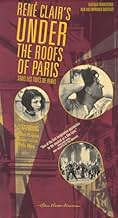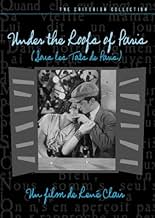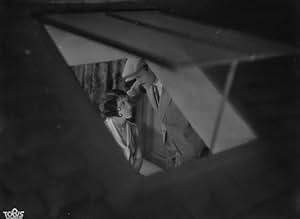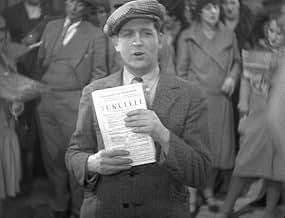CALIFICACIÓN DE IMDb
7.0/10
2.6 k
TU CALIFICACIÓN
Agrega una trama en tu idiomaAlbert is smitten for Pola but ends up wrongly committed in jail, in the meantime her affections are sought after by his friend, and on his release both love and friendship must be tested.Albert is smitten for Pola but ends up wrongly committed in jail, in the meantime her affections are sought after by his friend, and on his release both love and friendship must be tested.Albert is smitten for Pola but ends up wrongly committed in jail, in the meantime her affections are sought after by his friend, and on his release both love and friendship must be tested.
- Dirección
- Guionista
- Elenco
- Premios
- 1 premio ganado en total
Edmond T. Gréville
- Louis
- (as Edmond Gréville)
Delphine Abdala
- La buraliste
- (sin créditos)
Raymond Aimos
- Un gars du milieu
- (sin créditos)
Raymond Blot
- Un membre de la bande à Fred
- (sin créditos)
Thomy Bourdelle
- François
- (sin créditos)
Léon Courtois
- L'inspecteur
- (sin créditos)
Édouard Francomme
- Un membre de la bande à Fred
- (sin créditos)
André Michaud
- Un agent
- (sin créditos)
Jane Pierson
- La dame du premier
- (sin créditos)
Louis Pré Fils
- Le locataire du troisième
- (sin créditos)
Eugène Stuber
- Un membre de la bande à Fred
- (sin créditos)
Louis Zellas
- Le consommateur jaloux
- (sin créditos)
- Dirección
- Guionista
- Todo el elenco y el equipo
- Producción, taquilla y más en IMDbPro
Opiniones destacadas
10zetes
René Clair's early sound films are amongst the best ever made. Le Million (1931), Quatorze Juillet (1933), and Under the Roofs of Paris (1930) are masterpieces of musical comedy and romance (I leave out perhaps his most famous, À nous la liberté, which I need to see again). Under the Roofs of Paris is the loose but good story of a young street singer (Albert Préjean) who falls in love with a girl (Pola Illéry). He has an uneasy relationship with a couple of pickpockets (including Gaston Modot, who also made L'Âge d'or with Buñuel the same year) who like to work when he's demonstrating his talent. In the film's opening scene, there is an amazingly edited sequence of one of these men at work. Everyone wants Pola, including Albert's best friend, Louis, and when Albert is framed for burglary, they don't think twice about going after her. Clair's direction moves like silk. It's so supple. The camera movements, full of crane shots and pans, is technically stunning, especially for the time but even now. And the use of sound is absolutely revolutionary. It's more or less half silent, half talkie. Unlike many early sound films, Clair keeps the dialogue to a minimum, so it's never clunky. Characters only speak when they have to; at other times, they gesture. The film is often described as a musical, but it is not. There are two songs, and the music arises diagetically from an accordion player. The music, and the use of music, are quite amazing. This is one of the most wonderful movies ever made.
The great French film actor Jacques Tati made several films that tried to capture a Paris that disappeared even before World WarII. It was a world best seen through the gifted photography of Atget and Brassai. A world of intimacy, silent streets, virtually no traffic, limited means, but unlimited pleasures. A wonderful opening shot glides across rooftops to join a cluster of ordinary Parisians enjoying a singalong, an odd but compelling precursor of karaoke and rock concerts, but untarnished by special effects or hype. There is a sense that we are witnessing a street version of Lautrec's Moulin Rouge.
The cinematography is extraordinary. It can only be compared to Fritz Lang's "M", or the "Third Man". Very little actually happens and dialogue is used sporadically. Yet we find ourselves caring very much about the people about whom we know so little.
An unforgettable film.
The cinematography is extraordinary. It can only be compared to Fritz Lang's "M", or the "Third Man". Very little actually happens and dialogue is used sporadically. Yet we find ourselves caring very much about the people about whom we know so little.
An unforgettable film.
Having been highly impressed by "Le Million", I decided to check out Rene Clair's other acclaimed musical comedy, "Under the Roofs of Paris". I can happily assure you that this film was even better than "Le Million" in almost every single way. It amps up the heart and humor, has a much stronger emotional impact, and, while "Le Million" felt like a purely plot driven film, "Under the Roofs of Paris" balances plot and character to near perfection.
This hilarious love story unfolds slowly and steadily, introducing the audience to different characters and places without rushing everything. We watch and learn before the plot strikes us like a lightning bolt of beauty. Rene Clair's camera beautifully glides through the streets of Paris, following characters and peaking in on their most fragile moments. This film is like the finest work of literature; it contains laughs and tears, moments of melancholy and hope. It is, simply, a masterpiece.
This hilarious love story unfolds slowly and steadily, introducing the audience to different characters and places without rushing everything. We watch and learn before the plot strikes us like a lightning bolt of beauty. Rene Clair's camera beautifully glides through the streets of Paris, following characters and peaking in on their most fragile moments. This film is like the finest work of literature; it contains laughs and tears, moments of melancholy and hope. It is, simply, a masterpiece.
"Under the Roofs of Paris" is a film written and directed by René Clair. His direction is lovely--with some creative and lovely camera-work. As far as the story goes, it seems a bit thin.
The film begins with Pola being vigorously dated by Fred. In other words, the thug Fred isn't about to take no for an answer--and Pola is naturally creeped out by him. Ultimately, Fred steals her apartment key and Pola is understandably afraid to return home. When she bumps into Albert, he takes pity for her and takes her home. Over time, they fall for each other. However, Albert is arrested (thanks to his friend Emil) and Fred isn't about to allow Albert and Pola to be together. What's to come of them?
Technically, the film is a mixed bag--though I really cannot fault the film for its deficits. Although the film is part sound and part silent, films outside the United States took much longer to shift to all-talking pictures--so I accept that French films still were making the transition. Sound-wise, this 1930 film is very similar to 1927's "The Jazz Singer"--with a few songs and a bit of dialog but otherwise being essentially a silent film. However, what was very advanced was the camera work and the crane shots--they were very impressive and the film sure looked great.
Apart from the technical, the film had a story that seemed a bit weak. There isn't a lot of depth to the characters, they aren't necessarily likable and I didn't feel all that involved with them. So, overall, it is worth seeing but not a must-see--and not as good as some of the director's other efforts.
The film begins with Pola being vigorously dated by Fred. In other words, the thug Fred isn't about to take no for an answer--and Pola is naturally creeped out by him. Ultimately, Fred steals her apartment key and Pola is understandably afraid to return home. When she bumps into Albert, he takes pity for her and takes her home. Over time, they fall for each other. However, Albert is arrested (thanks to his friend Emil) and Fred isn't about to allow Albert and Pola to be together. What's to come of them?
Technically, the film is a mixed bag--though I really cannot fault the film for its deficits. Although the film is part sound and part silent, films outside the United States took much longer to shift to all-talking pictures--so I accept that French films still were making the transition. Sound-wise, this 1930 film is very similar to 1927's "The Jazz Singer"--with a few songs and a bit of dialog but otherwise being essentially a silent film. However, what was very advanced was the camera work and the crane shots--they were very impressive and the film sure looked great.
Apart from the technical, the film had a story that seemed a bit weak. There isn't a lot of depth to the characters, they aren't necessarily likable and I didn't feel all that involved with them. So, overall, it is worth seeing but not a must-see--and not as good as some of the director's other efforts.
--- this film changed my views on b&w, i first saw this when i was a wee lass of 13, awkward and shy, all i had to do with myself was watch late- night t.v. i cried so hard at the end of the film i thought for sure i'd wake my mum, thank god CBC showed it again not long after that, and like the big geek i was, and probably still am, i taped it, i liked the rawness of it, the sound wasn't very good, but it didn't matter, still doesn't, i would love to make a movie that has this same feeling the absolut "realness" i dislike the crud hollywood keeps churning out, but , the fact remains that i live in this time, and am almost forced to swallow the disgraceful porridge that is cinema. it's christmas day, i think i'll go slip on my "under the rooftops of paris" and dream of a time when film still had a heart!!
¿Sabías que…?
- TriviaThe opening sequence and the street scenes were filmed in a studio.
- Citas
Albert, a young street singer: [On seeing Pola bedding down on his bedroom floor] Okay, take the bed, I'll sleep on the floor.
- ConexionesFeatured in Les dossiers de l'écran: Boulevard du crépuscule (1969)
Selecciones populares
Inicia sesión para calificar y agrega a la lista de videos para obtener recomendaciones personalizadas
- How long is Under the Roofs of Paris?Con tecnología de Alexa
Detalles
- Tiempo de ejecución
- 1h 36min(96 min)
- Color
Contribuir a esta página
Sugiere una edición o agrega el contenido que falta






















